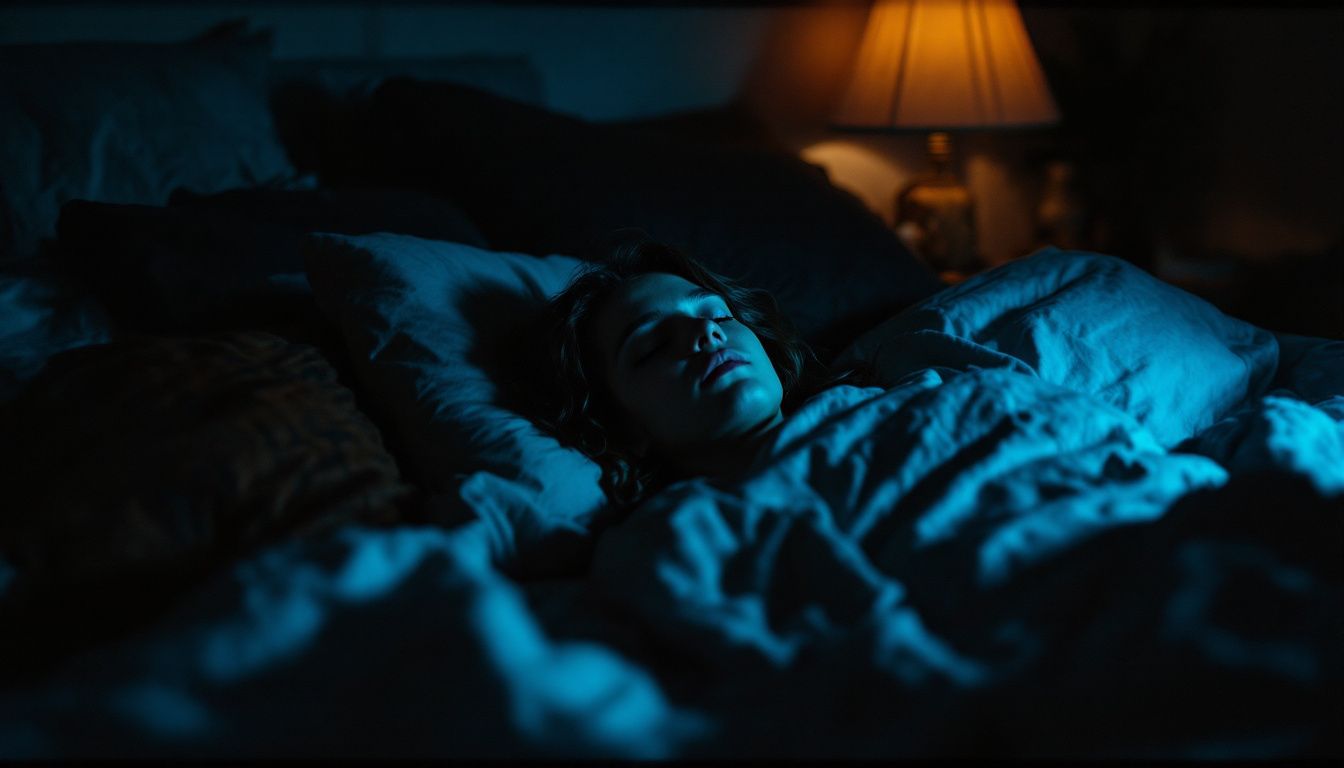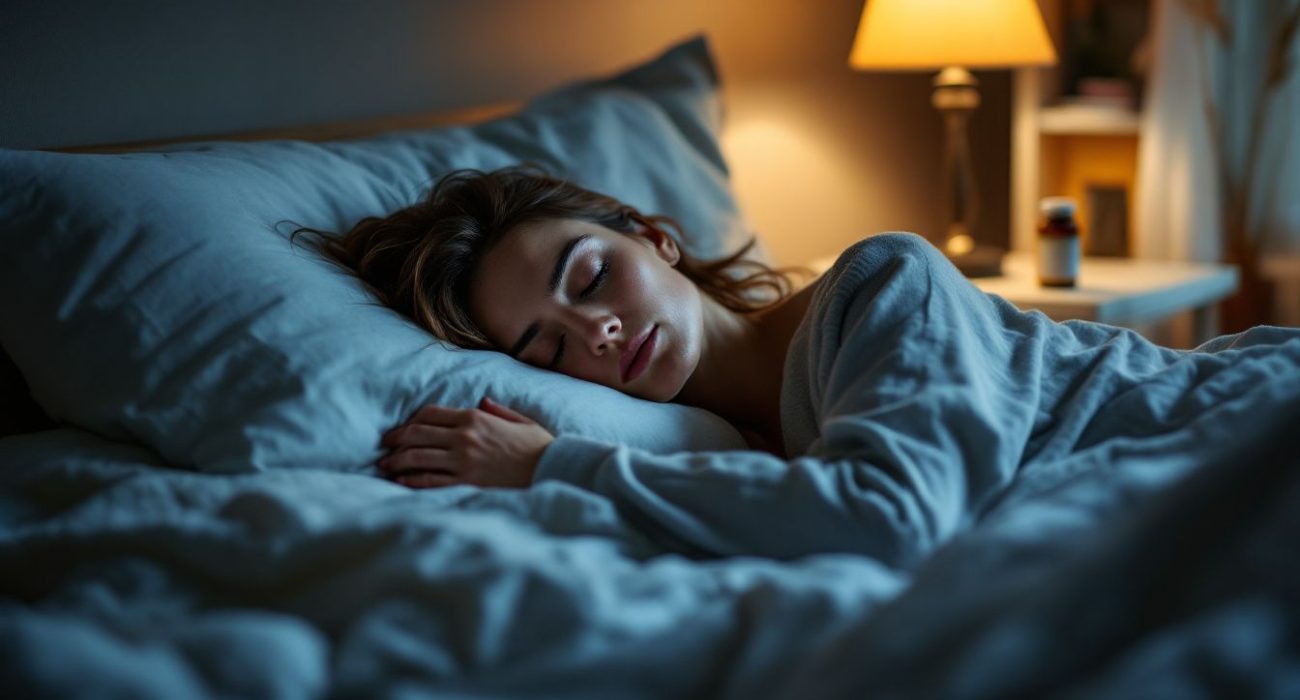Many people find it hard to sleep well at night. Valerian root, a natural herb, has been studied for its ability to help. This blog will talk about how valerian for sleep can be part of solving your sleeping problems.
Keep reading to learn more.
What Is Valerian?

Valerian is an herb that can be used for improving sleep. It comes from the root of the valerian plant and can be prepared in different forms such as capsules or teas.
Overview of Valerian Root
Valerian comes from the root of _Valeriana officinalis_. This plant has valerenic acids, iridoids, lignans, flavonoids, and essential oils. People have used it since ancient times in Greece and Rome for sleep problems.
About 1.1% of U.S. adults, which is around 2 million people, use valerian each week as a sleep aid.
This root helps you sleep better by having a calming effect on your brain and nervous system. It is part of many herbal products for sleeping better without needing a prescription from the doctor.
Its history shows it’s trusted to improve sleep quality and manage mild insomnia among other sleeping disorders.
Common Preparations of Valerian
People use valerian in many ways to help them sleep. They make tea from it or take it as drops, capsules, or pills. Studies have tested doses from 225 mg to 1215 mg per day. This shows there are many options for using this herb.
Next, let’s look at how valerian improves sleep.
How Does Valerian Work for Sleep Improvement?

Valerian works for sleep improvement by affecting the brain and nervous system. Its compounds may help enhance sleep quality and reduce the time it takes to fall asleep.
Effects on the Brain
Valerian likely helps people sleep by raising gamma-aminobutyric acid (GABA) levels in the brain. GABA is a chemical that calms nerve cells. This calming effect makes it easier to fall asleep and stay asleep.
It makes the brain relax, helping with trouble sleeping.
This herb affects how relaxed and sleepy you feel. Its impact on the brain is why many choose it for better sleep quality. People use valerian instead of sleep medicines because it’s natural and has fewer side effects.
Impact on the Nervous System
Moving from how Valerian affects the brain, it’s crucial to look at its impact on the nervous system. This herb works by boosting levels of a chemical called gamma-aminobutyric acid (GABA).
GABA helps calm the mind. It acts as a brake for an overly excited nervous system. This is key for people who struggle with sleep disorders or chronic insomnia.
Valerian’s calming effect can make it easier to fall asleep and improve sleep quality. It does this without the harsh side effects often seen with prescription sleeping aids. People looking for safe ways to manage their sleep problems might find relief with Valerian.
Historical and Traditional Uses of Valerian

People in Europe and the U.S. use valerian for sleep problems, stress, premenstrual syndrome (PMS), and menopause issues. This use is not new. Since ancient Greece and Rome times, people have known about valerian’s calming effects.
They used it to get better sleep and reduce anxiety.
Ancient doctors wrote about valerian’s benefits for various conditions. They believed this herb could help with many ailments because of its sedative effect. Today, those old uses match what we know from science about how valerian works on the brain and nervous system to improve sleep quality and tackle insomnia symptoms.
Clinical Studies on Valerian and Sleep

Clinical studies have investigated the effects of valerian on improving sleep. Findings from these studies shed light on its potential as a natural aid for better sleep quality and managing sleep onset latency.
These studies have explored how valerian may positively impact sleep disorders, offering valuable insights into its effectiveness in promoting healthier sleep patterns.
Key Findings from Randomized Controlled Trials
Studies on valerian root show mixed results for sleep improvement. In one study by Jacobs in 2005, people took 600 mg of valerian daily for 28 days. This study found no big difference compared to a fake pill group.
But another study by Jansen in 1977 had different findings. Here, taking 100 mg of valerian each day for a month helped 85% of the people sleep better compared to only 51% who took the fake pill.
Vorbach’s research from 1996 adds more proof that valerian can help with sleep. Participants used 600 mg of valerian every day for four weeks. Results showed that two-thirds (66%) saw their sleep improve, which was much better than the group not taking real medicine (26%).
These studies highlight how using valerian might be good for some individuals looking to get better rest at night.
Meta-Analysis of Valerian Effectiveness
A big study looked at 16 tests with 1,093 patients to see if Valerian helps sleep. The study found mixed results. But it showed Valerian made it twice as likely for people to sleep better compared to those who took a fake pill (placebo).
This shows that Valerian can be a good choice for those having trouble sleeping.
This research used careful methods to check how well Valerian works. With a chance of improving sleep being higher in people taking Valerian, it offers hope for managing sleep problems without the need for strong medicines.
Benefits of Valerian for Sleep Improvement
Valerian enhances sleep quality and reduces the time it takes to fall asleep. It also helps manage sleep disorders, promoting deep and restful sleep.
Enhancing Sleep Quality
Some studies show that valerian helps people sleep better. It can make the quality of sleep better than before. People who take valerian might fall asleep faster and have a deeper sleep.
Valerian made people fall asleep about 41 minutes faster compared to those who did not take it. This shows it can be a good choice for improving how well you sleep at night.
Reducing Sleep-Onset Latency
Valerian helps people fall asleep faster. One study by Kuhlmann in 1999 showed that taking 600 mg of valerian for two weeks made it quicker for people to fall asleep by about 7.4 minutes.
Other trials found improvements ranging from 14 to 17.7 minutes.
This shows valerian can be good for those having trouble falling asleep quickly. It works on the nervous system and brain, making sleep come more easily.
Managing Sleep Disorders
When managing sleep disorders, it’s crucial to recognize that insomnia impacts a significant portion of the population. Globally, about 30-40% of individuals face occasional sleep troubles, while 10-15% grapple with severe insomnia, and roughly 25% of the elderly contend with chronic sleep issues.
These figures emphasize the prevalence of sleep disorders among people.
Furthermore, since 69% of primary care patients struggle with insomnia, it’s important to address and comprehend effective strategies for managing sleep disorders, such as exploring the potential benefits of valerian root.
Valerian has been traditionally utilized to improve sleep quality and decrease the time it takes to fall asleep, offering a potential solution for various types of sleeping disorders.
Moreover, valerian may also offer hope in addressing chronic insomnia commonly found in elderly individuals.
In conclusion, managing sleep disorders can be quite challenging, but the availability of potential natural remedies like Valerian Root provides encouragement.
Safety and Side Effects of Valerian
Valerian can cause common side effects in some people. It’s important to read more about these safety measures before using it.
Common Side Effects
Valerian can cause several side effects in some people. These may include headaches, dizziness, stomach problems, difficulty sleeping, feeling sleepy during the day, and vivid dreams.
One study found that 18% of people in the valerian group experienced adverse events compared to 8% in the placebo group.
The side effects may sometimes occur when taking valerian root as a dietary supplement for sleep improvement. These could affect different people in various ways. Some might feel drowsy or dizzy while others experience vivid dreams or difficulty sleeping.
Who Should Avoid Valerian?
Pregnant or breastfeeding individuals, children under 3, and people with liver disease are advised not to use Valerian. Additionally, it is advisable for users to refrain from driving or operating machinery after taking it.
Now, let’s explore the next topic: “Valerian Dosage for Sleep Improvement”.
Valerian Dosage for Sleep Improvement
Discover the optimal dosages of valerian root and how to use it effectively to improve your sleep. For more details, check out our blog!
Recommended Dosages
Studies suggest a daily dosage of valerian ranging from 225 mg to 1215 mg. It is found effective for sleep improvement. Effects might take at least two weeks to show.
Best Practices for Usage
To get the most out of valerian root for improving sleep, it’s important to take certain steps. Avoiding caffeine late in the day and sticking to a regular sleep schedule can support the effectiveness of valerian.
It’s beneficial to have a 1-2 hour wind-down period before going to bed as well. These practices work together with using valerian to make sure you’re giving yourself the best chance for improved sleep quality.
Valerian can be more effective when combined with these habits: avoiding late-day caffeine, maintaining regular sleep schedules, and having a wind-down period before bedtime.
Comparisons of Valerian with Other Sleep Aids
Comparing Valerian with Other Sleep Aids. Read More about the effectiveness of Valerian for sleep improvement in comparison to other options available.
Valerian vs. Melatonin
Valerian and melatonin are commonly utilized to enhance sleep quality. Valerian is an herbal supplement, while melatonin is a hormone that regulates sleep-wake cycles. Valerian operates by influencing specific brain receptors, leading to relaxation and improved sleep.
Conversely, melatonin directly affects the body’s internal clock to encourage drowsiness.
Regarding safety, valerian has minimal reported side effects and interactions in comparison to melatonin. Research has indicated that both can decrease the time it takes to fall asleep and enhance overall sleep quality, although individual responses may differ.
It’s crucial to seek advice from a healthcare professional before using either supplement, particularly if you are taking other medications or have existing health conditions.
Valerian vs. Prescription Sleep Aids
Valerian root is safer than prescription sleep medications. It has fewer reported side effects and doesn’t cause significant hangover effects like prescription sleep aids do. Studies show that valerian provides a statistically significant improvement in sleep quality compared to placebos, with a relative risk of 1.8.
However, methodological issues in valerian studies affect reliability, unlike more standardized prescription medications.
Consulting a healthcare professional is crucial for both valerian and prescription sleep aids to check for potential interactions and appropriate dosages. Adverse events from valerian are inconsistently reported, whereas documented side effects are more common with prescription sleep aids which have been noted by several users without any statistical significance associated with it when compared against the use of Valeriana Officinalis Root preparations.
Drug Interactions and Precautions
Be careful about interactions: mixing valerian with other medications can cause problems. Find out more by reading on.
Potential Interactions with Medications
Valerian can interact with alcohol, benzodiazepines, narcotics, and supplements like St. John’s wort. It’s important to consult a healthcare provider before using Valerian due to the likelihood of potential interactions with these medications.
Effects on Laboratory Tests
Valerian root doesn’t have significant effects on laboratory tests.
Moving on to “Regulatory Status of Valerian”.
Regulatory Status of Valerian
Valerian’s Regulations in the U.S. and Beyond – What You Should Know. To learn more, read our blog.
Approval and Oversight in the United States
Valerian supplements are not regulated by the FDA like drugs. It’s important to confirm product quality and consult healthcare providers before use, as there’s limited oversight from regulatory authorities.
This means consumers need to take extra care when considering valerian for sleep improvement.
Moving on to “Conclusion” about Valerian for Sleep Improvement….
Conclusion
In summary, after all the research and trials on valerian for sleep improvement, there are mixed results on its effectiveness. It’s important to be cautious due to potential side effects, interactions with other medications or supplements, and lack of regulation by the FDA.
Seeking advice from credible sources like NCCIH and ODS before using valerian is crucial. For ongoing insomnia issues, it’s best to seek professional evaluation rather than relying solely on herbal remedies.
Future research should aim for more conclusive evidence regarding valerian’s efficacy and safety for sleep improvement through larger standardized trials.

